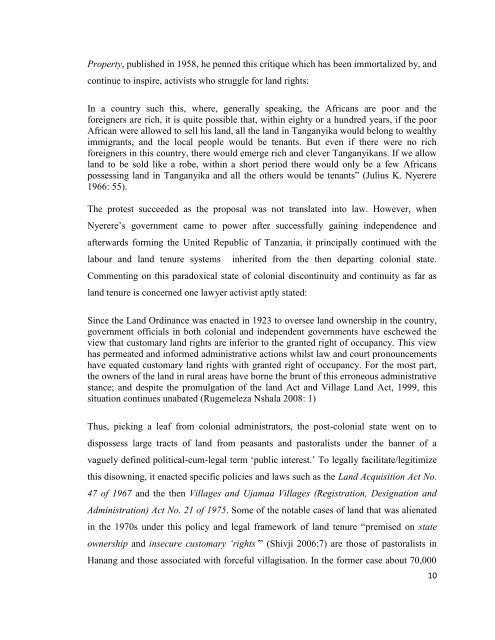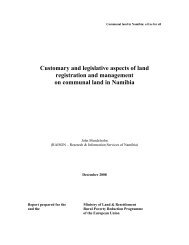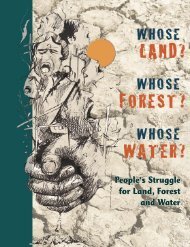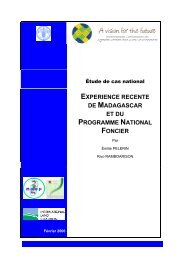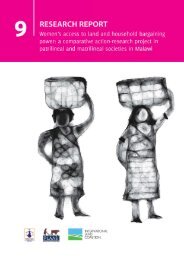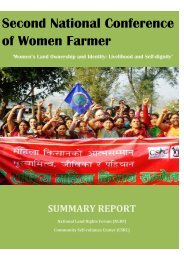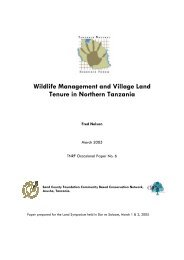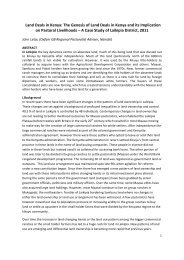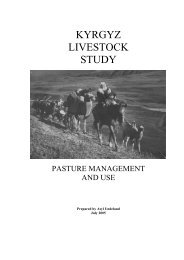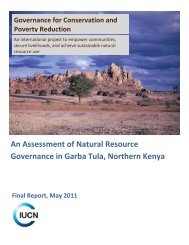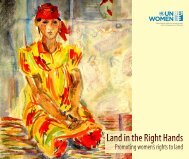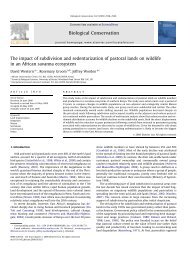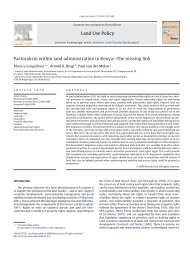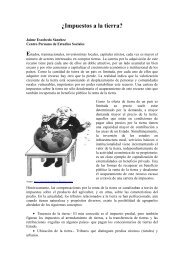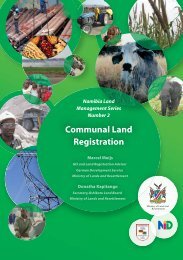accumulation by land dispossession and labor ... - Land Portal
accumulation by land dispossession and labor ... - Land Portal
accumulation by land dispossession and labor ... - Land Portal
You also want an ePaper? Increase the reach of your titles
YUMPU automatically turns print PDFs into web optimized ePapers that Google loves.
Property, published in 1958, he penned this critique which has been immortalized <strong>by</strong>, <strong>and</strong><br />
continue to inspire, activists who struggle for <strong>l<strong>and</strong></strong> rights:<br />
In a country such this, where, generally speaking, the Africans are poor <strong>and</strong> the<br />
foreigners are rich, it is quite possible that, within eighty or a hundred years, if the poor<br />
African were allowed to sell his <strong>l<strong>and</strong></strong>, all the <strong>l<strong>and</strong></strong> in Tanganyika would belong to wealthy<br />
immigrants, <strong>and</strong> the local people would be tenants. But even if there were no rich<br />
foreigners in this country, there would emerge rich <strong>and</strong> clever Tanganyikans. If we allow<br />
<strong>l<strong>and</strong></strong> to be sold like a robe, within a short period there would only be a few Africans<br />
possessing <strong>l<strong>and</strong></strong> in Tanganyika <strong>and</strong> all the others would be tenants‖ (Julius K. Nyerere<br />
1966: 55).<br />
The protest succeeded as the proposal was not translated into law. However, when<br />
Nyerere‘s government came to power after successfully gaining independence <strong>and</strong><br />
afterwards forming the United Republic of Tanzania, it principally continued with the<br />
labour <strong>and</strong> <strong>l<strong>and</strong></strong> tenure systems inherited from the then departing colonial state.<br />
Commenting on this paradoxical state of colonial discontinuity <strong>and</strong> continuity as far as<br />
<strong>l<strong>and</strong></strong> tenure is concerned one lawyer activist aptly stated:<br />
Since the L<strong>and</strong> Ordinance was enacted in 1923 to oversee <strong>l<strong>and</strong></strong> ownership in the country,<br />
government officials in both colonial <strong>and</strong> independent governments have eschewed the<br />
view that customary <strong>l<strong>and</strong></strong> rights are inferior to the granted right of occupancy. This view<br />
has permeated <strong>and</strong> informed administrative actions whilst law <strong>and</strong> court pronouncements<br />
have equated customary <strong>l<strong>and</strong></strong> rights with granted right of occupancy. For the most part,<br />
the owners of the <strong>l<strong>and</strong></strong> in rural areas have borne the brunt of this erroneous administrative<br />
stance; <strong>and</strong> despite the promulgation of the <strong>l<strong>and</strong></strong> Act <strong>and</strong> Village L<strong>and</strong> Act, 1999, this<br />
situation continues unabated (Rugemeleza Nshala 2008: 1)<br />
Thus, picking a leaf from colonial administrators, the post-colonial state went on to<br />
dispossess large tracts of <strong>l<strong>and</strong></strong> from peasants <strong>and</strong> pastoralists under the banner of a<br />
vaguely defined political-cum-legal term ‗public interest.‘ To legally facilitate/legitimize<br />
this disowning, it enacted specific policies <strong>and</strong> laws such as the L<strong>and</strong> Acquisition Act No.<br />
47 of 1967 <strong>and</strong> the then Villages <strong>and</strong> Ujamaa Villages (Registration, Designation <strong>and</strong><br />
Administration) Act No. 21 of 1975. Some of the notable cases of <strong>l<strong>and</strong></strong> that was alienated<br />
in the 1970s under this policy <strong>and</strong> legal framework of <strong>l<strong>and</strong></strong> tenure ―premised on state<br />
ownership <strong>and</strong> insecure customary ‘rights’‖ (Shivji 2006:7) are those of pastoralists in<br />
Hanang <strong>and</strong> those associated with forceful villagisation. In the former case about 70,000<br />
10


